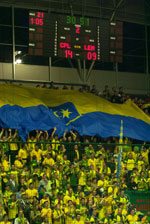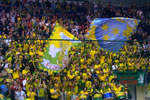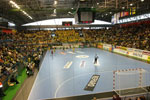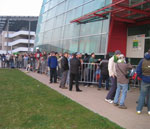Celje Pivovarna Laško Handball Club
At the end of 2003, the Celje Pivovarna Laško Handball Club agreed to begin selling tickets for their sporting events via an electronic ticketing system. Let’s take a closer look at how these efforts got underway.Slovenia was selected to be the host country for the European Men’s Handball Championship to begin in early 2004. The majority of the investment was devoted to the sports infrastructure in Celje. A new, modern sports hall was constructed for the championship, including the electronic ticketing infrastructure - computers and computer network, high-speed thermal printers and an access control system with seven control units. The hall was also to become the club’s permanent new home.
The decision to introduce an in-house electronic ticketing system was explained by the board president of HC CPL: »The stable operation of the DRAGON Venue Sports Edition system during the spring preparations for the championship assured us of its durability, quality, capacity and flexibility. Additional assurance was provided by the DRAGON team’s professional attitude, with which they supported the smooth operation of the system. We wanted to have an efficient and transparent ticketing system which would satisfy as closely as possible the standards of all major European handball clubs, and as such satisfy the demands of the club, the sponsors, VIP guests, business partners, foreign and domestic fans, and last but not least the market and other inspectorates supervising our business operations on a yearly basis. Besides, the aim was also to increase the interest and ticket sales for our club’s matches beyond local borders, in all Slovenian regions, and further.«
Before upgrading to the in-house electronic ticketing system, the club had been handling its ticket sales the old-fashioned way - using pre-printed receipt pads. The pre-sale was physically limited to the club’s premises; two additional box offices opened on match days. Ticket pre-sales were extremely low, and actually limited only to the VIPs, sponsors, and order forms by different companies.
Purchasing tickets was only possible in the club’s box offices. Establishing a distribution net had been logistically and organisationally too complex for the club to manage on its own. Frequent newspaper articles displayed photos of disgruntled fans standing in long queues on the eve of ticket sales, where the tense atmosphere at times even created disturbances that required police intervention. Those unpleasant circumstances created the ideal conditions for the emergence of a black market, where the tickets for Euro league matches were sold for several times higher than their marked cost.
»During the season, the most attractive matches were always sold out, as the city of Celje had always been known for its fanatic handball public. Besides, our old sport hall contained far fewer seats than the new one. Actually, we were quite satisfied with the situation at our club, and we didn’t feel a need to make any changes. The majority of the club’s budget was tied to sponsors’ money, so we didn’t focus our attention on ticket sales. We could not have expected any greater influx of income anyway, considering the old hall’s capacity, all our obligations to sponsors, guests, etc., and finally, the general public’s interest in handball.« explained the club’s former president, Mr. Vlado Privšek.
»However, the situation is completely different today, with the club having made progress towards the top echelons of European handball. It means playing with the best European teams, which generates great publicity and general public interest. Besides, the new hall can accommodate more than 6.000 spectators. We saw in this new environment a golden opportunity to also make progress in the area of ticket sales.«
HC CPL signed the contract in November 2003; in regards to the various options for the introduction of the DRAGON Venue system, the club’s management agreed on a gradual, step-by-step approach. The plan was a routine, full operation of in-house ticketing, connected to the access control system by the end of the 2003/04 season. The solution was to be slowly upgraded with modules for season ticket sales, direct marketing, Internet sales, and sales via the Mojekarte distribution net. Given that the club (somewhat unexpectedly) won the Champions League in 2004, things had begun to move much more quickly than anyone had planned.
DRAGON TICKETING INTRODUCTION AND USAGE
Introducing the staff to the new system, and its associated training, presented a considerable organisational challenge, as is quite often the case when long-ingrained habits and procedures need to be changed. However, all the elements turned out well in our favour - the information and telecommunications equipment was well designed and worked stably and, in addition, the club’s administrative personnel benefited from their experience at EURO 2004 and were fully trained on the use of the box-office module. Our team provided various options for the hall’s seating plan, different databases, etc. Most certainly, the very high level of staff motivation, engendered by the club’s leadership, also contributed to the successful launch.The training process kicked off in the typical fashion. First, the registry database was populated in cooperation with the client; the information formerly kept in different files was transferred into the system (for example, the list of season ticket holders). We then created the ticket, receipt and standard report forms. The functional possibilities of the system were represented through different use cases, and evaluated from the standpoint of the club’s customary business practices. We checked together which of the functional possibilities would be most relevant to the club’s operations, and when and how to use them. The period of preparation lasted merely a few days; on the 16th of December 2003, the first tickets processed through SI Ticketing were sold for the autumn rounds of the Champions League, HC CPL: ADEMAR LEON.
Each electronic ticket contained, apart from other data, a unique bar code which enabled passage through the Kaba access control units. The scanners read the bar codes from a distance of 10–15 cm, while the system checked in real time the type and validity of the ticket, and registered the entry into the system.
For only a brief initial period, visitors needed some assistance with registering their tickets, but very soon this issue was fully resolved. On the 15th of February 2004, two months after the introduction of the system, a record number of registered entrances was achieved: between the hours of 16:00 and 17:00, 3.637 spectators entered the hall to watch a competition between HC CPL and German TBV Lemgo. This pace translates to more than one visitor per second, which is an outstanding example of the exceptionally high-speed operation of the access control system.
As the HC CPL advanced steadily towards the tournament final of the Champions League, the club’s management decided to take advantage of vastly renewed fan interest - they began their season ticket pre-sales much earlier than usual. The additional advantage offered by the pre-sale, which started in early spring, was that buyers were entitled to purchase tickets at the same time for the Champions League final tournament. Meanwhile, the club decided to update its ticket design - the new tickets were created in a standard credit card format, with full-colour printing on the plastic. Complete responsibility for this task was assumed by the DRAGON team, fully equipped with the finest printers and our own proprietary software, supporting total control over the ticket printing process and providing each ticket processed by the system a unique barcode compatible with the DRAGON Access Control solution. The printers we use operate with a special colour-sublimation technology, which guarantees a high-quality, smudge-resistant product. This print durability is extremely important in cases where ticket owners decide to hold the same seat for more than one season. The procedure for renewing a season ticket is virtually effortless; the seat-holder merely scans the ticket’s bar code. All the rest is handled by the DRAGON Venue Sports Edition solution - seat reservations for the entire season in the electronic seating plan, extending the validity of the bar code in the access control system, printing receipts, updating the marketing database, etc.
Congratulations to HC CPL in concluding their 2003/04 season as winners of the Champions League! And we’re very happy to report that, as a consequence, the 2004/05 season was characterized by unrestrained “handball euphoria.” Tickets for the international matches played in Celje became the most sought-after “prize” among Slovenian sports fans. This rebirth of public interest persuaded the club’s management to offer tickets through organised pre-sales via 300 vendors of the Mojekarte distribution net, as well as via online web sales on www.mojekarte.si. To prepare for this explosion in fan interest, before the 2004/05 season our DRAGON team carried out additional staff training, with a special emphasis on managing the system for distribution net sales, use of the voucher exchange functions, and real-time, online control of distribution net sales. Together with the client, we selected the content and design of the voucher.
Automatic access control for visitors to Zlatorog Hall operated precisely as expected, and this validated the anticipated benefits of the print@home capability. The solution supports printing of fully valid physical tickets on the user’s home printer, irrespective of whether the individual purchased on the web or at one of the vendors’ box offices. As tickets are identified by unique bar codes, entry through the access control units is possible only once for each unique ticket; all others (duplicates) are denied by the system at the gates. Ticket designs for the same match can differ, depending on the location and method of purchase, suggesting a need for security staff training to avoid possible confusion. However, the only information that truly matters is picked up by the scanner, which will signal the bar code’s validity. The print@home solution is extremely efficient and simple to use; however, the potential for confusion or even distrust could mean that the Slovenian environment is not quite ready for it. This was the reason that we, together with the client, chose instead to operate a voucher exchange system - the buyers receive vouchers which must be exchanged for the “real” ticket at the organisers’ box offices. The procedure is quite straightforward: the cashier simply scans the voucher’s bar code and the system automatically prints out the ticket. There can be an argument that buyers must pay a second visit to the organiser’s box office; however, it’s virtually the same as having the tickets in their pocket, as vouchers can be redeemed right up until the event’s start time, or even later. And when it comes to the biggest events of the season, the truth is that people really don’t care if they’re holding vouchers or tickets in their hands - only that they’ve got a seat.
At first, the club expressed some degree of hesitation to launch a new system of pre-sales, fearing the potential for inequitable distribution. Therefore, the management agreed to release just a certain quota to the general public. After the first few international games had been played, the quota decision was deemed unworkable and without purpose, so the administration chose to fulfil its obligatory reservations (guests, sponsors, etc.) and release all remaining seats to pre-sales. (However, the dynamic system could have made it possible at any time to decrease or increase the quota available on the free market.) Management’s revised decision had an immediate effect, as the number of pre-sales tickets rose steadily from game to game.
Before the 2005/2006 season, club management obtained three handheld scanners to control access for all those visitors not entering the hall through the main gates (guests, VIPs, etc.). The programme solution supports the transfer of all “special classification” electronic tickets into the scanner. The scanners are used by security personnel, whose duty is to check and register any visitor entering the hall from anywhere other than through the main access control units. This security control has a double purpose: it collects a separate data record on special-classification ticket sales and usage, and it prevents those tickets from being used more than once.
The quantitative aspect of the ticket sales functionality supported by the DRAGON Venue Sports Edition solution can be illustrated by the following numbers, valid for the period of December 2003 until the end of the 2005/06 season: 16.904 sale transactions, or 167.937 registered tickets for separate events, and 3.637 season tickets. The automatic access control system registered 50.429 passages through control units.
The qualitative aspect can be positively confirmed by the fact that, during the entire period of system operation, not one critical error occurred, and those very few anomalies present were ascribed to specific, independent human actions (e.g. interchanging of control units among the organisers, and moving them to different locations).
SUMMARY
Today, HC CPL is using the best-organised and fullest-featured electronic ticketing system in Slovenia. Mr. Andrej Šušteršič describes his experience with the DRAGON system: »The introduction of electronic ticketing was justified, both from an economic and an organisational standpoint, almost immediately. We can’t be absolutely certain that the increased ticket sales are purely a result of using the system, but the fact is that our parking lot is now full of vehicles from the whole of Slovenia, which is definitely a result of well-organised pre-sales via the distribution net and www.mojekarte.si. The transparency of the system is unequivocal. We know at any moment how many tickets have been sold, where they have been sold, how much money we have made, how many available tickets have been released, how many seats have been reserved, etc. The procedures are much simplified, the reports can be done immediately after the event concludes, the number of phone calls is radically reduced, and our administrative personnel are now under much less pressure.We admit that we were quite sceptical at first, but now we can say that using this system has practically no bad side, while on the other hand there are many very transparent and easily measurable good sides. We also greatly appreciate the importance of the experience of the DRAGON team, which supports us throughout the year with software updates and support to help us provide even better service to our fans and other visitors.« The club’s secretary, Mrs. Sasa Lesek, adds: »Before we started using the system, there were so many things to keep in mind for just the ticket printing alone. It’s much easier now, as all we need to be concerned with is having the paper in stock, while the tickets are printed here on the club’s premises. Changing the wording on the tickets, or adding a new logotype, takes only a few minutes. With our old system, there was also a great deal more administrative paperwork, as all information was hand-written and stored manually. Now, all that is handled effortlessly by the DRAGON system, with reports available at any time we desire. We are also very satisfied with our pre-sale successes. This has considerably reduced our volume of work, and has also lowered costs - it is a very common occurrence now that box offices don’t even need to be open on match days, since every ticket has already been bought in pre-sales!«




